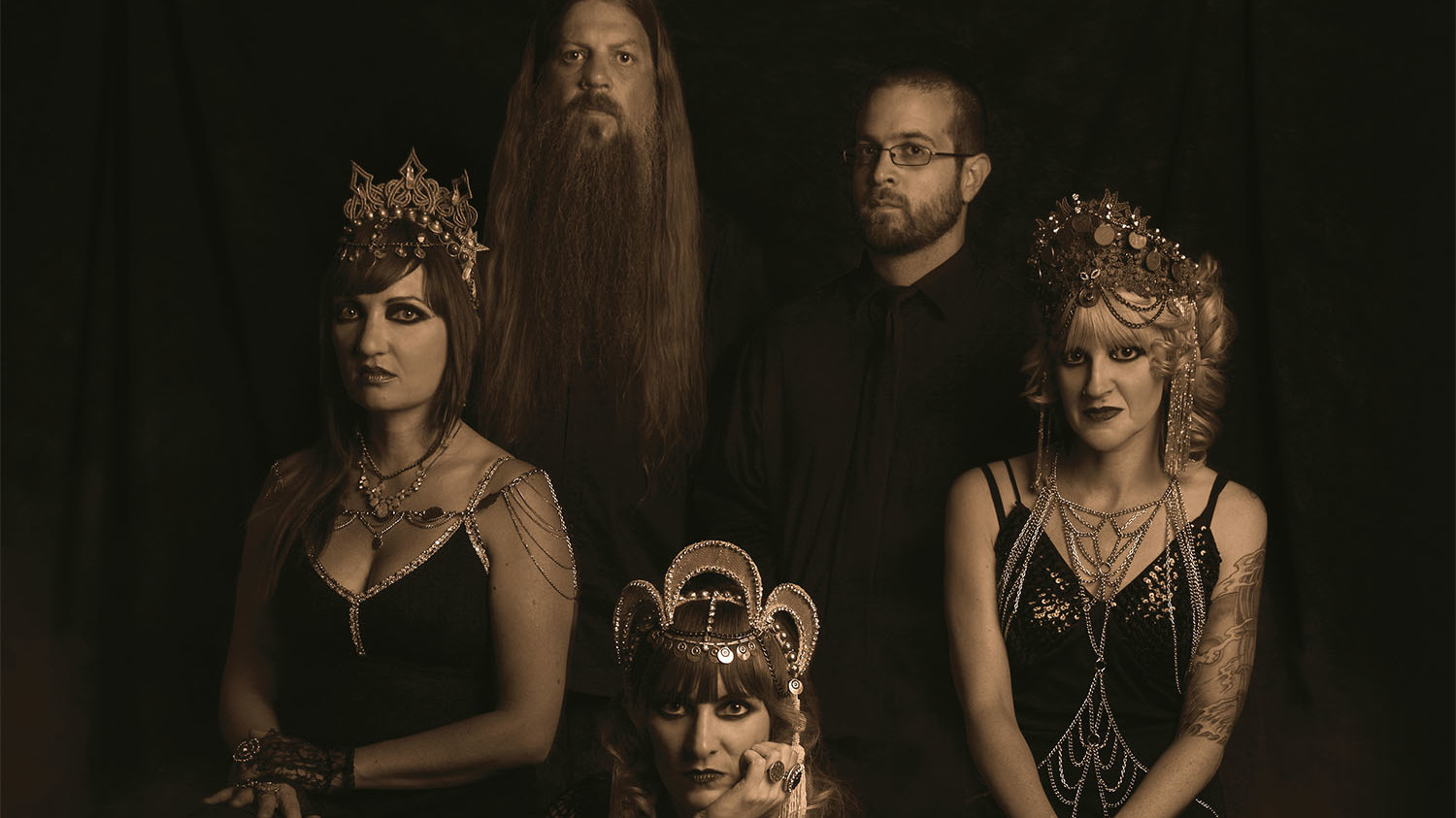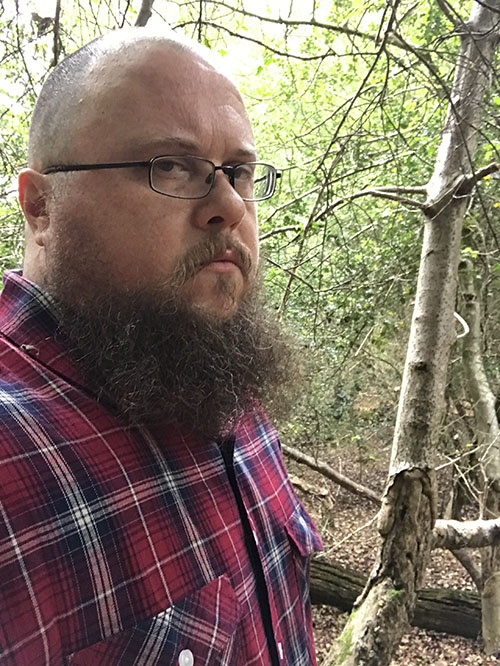“Growing up in the church, around church culture, I never fit in with it, ever. The philosophy of how the church operates is too parental, too condescending, it’s like trying to protect people from the truth in a way that doesn’t contribute to their development, or their confidence in their own ability to choose for themselves.”
Rebecca Vernon, SubRosa’s singer, guitarist, songwriter and guiding light, is expounding on themes explored on the Salt Lake City doom quintet’s immersive new album, For This We Fought The Battle Of Ages. Themes of freedom and control, ageless concerns, have bizarrely found their way to the forefront of her psyche via a 1920s Russian sci-fi novel. Written by twice-exiled naval architect Yevgeny Zamyatin, We is a proto-1984 future-world dystopia following the poignant path to realisation of a man named D-503, serving the world government OneState in a society where imagination is a sickness and freedom is feared. When did it first dawn on Rebecca that this book was something SubRosa should write an album around?
“It was within 20 pages,” she recalls. “It perfectly captured so many things I’ve felt my whole life, it really spoke to me. By page 20 I was thinking, ‘We need to write the next album about this book!’”
Which ideas resonated the most? “I’m a huge believer in the individual over collective happiness, the individual over
the group. I know that’s such a simple belief, but We captures that really well. I believe in the individual’s ability to choose for themselves, and not have other institutions inflicting their will on an individual conscience, thinking they know better. Those ideas aren’t rare, but they’re the core of how I live my life. I’m not very good at putting it into words, but like art does, We expresses it 10 times better, with so many layers.”
Like the album, in fact. The subject matter is given a radiant, evolving musical arrangement representing the totalitarian darkness and psychological horror of the scenario, as well as the essential light of hope and human spirit. Broadly based around the book’s themes, Rebecca’s lyrics are entirely her own reflections and interpretations, rather than a straight narrative retelling.
“The things the characters go through are applicable to all our lived experiences,” she asserts. “D-503 is going through an awakening I think everyone can relate to that moment where you start to question some belief you hold dear and realise it’s not true. As you get older that experience becomes more complex and painful; you have to shed older beliefs and open your mind to new ones as you sort through the new philosophies you’re hit with. It’s hard when you start to feel something different but no one around you is feeling that way. It happened to me so many times, I feel I can relate to him.”
It sounds like an irresistible parallel can be drawn with the band’s own situation at home; Utah is traditionally the most Republican state in the US. “It is relevant,” Rebecca agrees. “When we started writing the album in early 2015, the election was far away, so it’s weird the album is coming out two months before it, when the political environment is ridiculous and depressing, like a circus, with candidates wanting to interfere with people’s freedom.”
As in the music, there is hope, As the home of Mormonism, Salt Lake City has a reputation as a very isolated, religious, conservative community. Although she identifies as a Mormon – “I’m very different from other Mormons,” she says, “I see the oppression of organised religion, but I believe in certain things in the church that are very simple and good, that get obscured by the human filter” – when Rebecca moved to Salt Lake aged 18, she hated it and soon left. “But something kept calling me back,” she muses. “I just got the overwhelming feeling that this was the place for me. There is a huge counter-culture here, a huge music scene, a huge art scene, with all kinds of different ethnicities. There’s a lot of diversity in Salt Lake – you wouldn’t expect it, but it’s true! I’ve been so happy here, I found my niche, and so many wonderful friends. I feel part of something vital and important. It gives me purpose.”
Once introduced to the local music scene, Rebecca plunged in with gusto. “I was in about a dozen bands before SubRosa,” she reveals. “For almost 10 years I was that person who has four band practices a week, goes to four shows a week. I really honed my skill and took a lot of pride in playing drums, but I started getting this nagging feeling that I needed to write my own music. I was really scared; I’d never sung in front of people, never written a song, I was uncomfortable being a leader, but the motivation was to write a certain kind of music that puts a certain kind of energy into the world. I felt I had music inside me that needed to come out.”
That music eventually came out in a hugely distinctive and mesmerising way, albeit helped by a healthy dollop of serendipity. The band’s unique double-violin setup, for example, came about only because Rebecca’s violinist friend Sarah wanted to join her band; second violinist Kim was later added as Sarah’s temporary replacement, but was kept on mainly because Rebecca couldn’t face losing her (“Sarah and Kim are my best friends,” Rebecca emphasises. “Our friendship is even more important than the band”). It’s tempting to wonder if Rebecca’s original vision emerged fully formed, or fell into place gradually?
“I think both,” she’s quick to reply. “I wanted SubRosa to be angry, assertive, very strong and confident, I wanted to sing about things that mattered to me. Then we discovered this weird, dark folk element that stayed with us. I always wanted raw, brutal, stripped-down riffs, they’ve gotten more sophisticated over the years but they’re still really heavy. It evolved as we got exposed to more doom metal, and started loving it more and more.”
As with many instinctive innovators working in relative isolation, Rebecca’s vision for SubRosa predated her awareness of any musical kindred spirits. “I felt I wanted to make this sort of music before I’d heard Isis, Neurosis and Cult Of Luna,” she stresses. “When I heard those bands I thought, ‘That’s it, that’s the music I want to make, I need to give up!’ It’s only after SubRosa formed in 2005 that I slowly realised there was this whole underground doom scene. We never started going in that direction just to fit in with it, but we loved many elements, and it absorbed into our music really naturally.”
Ultimately, for Rebecca, the self-expressive urge she started feeling 15 years ago was born out of the same impulses that are powerfully evident throughout SubRosa’s latest (and greatest) work. “We had this purity of intent,” she explains. “We knew we had to get these feelings out of us, and put them into music.”
For This We Fought The Battle Of Ages is out now via Profound Lore

